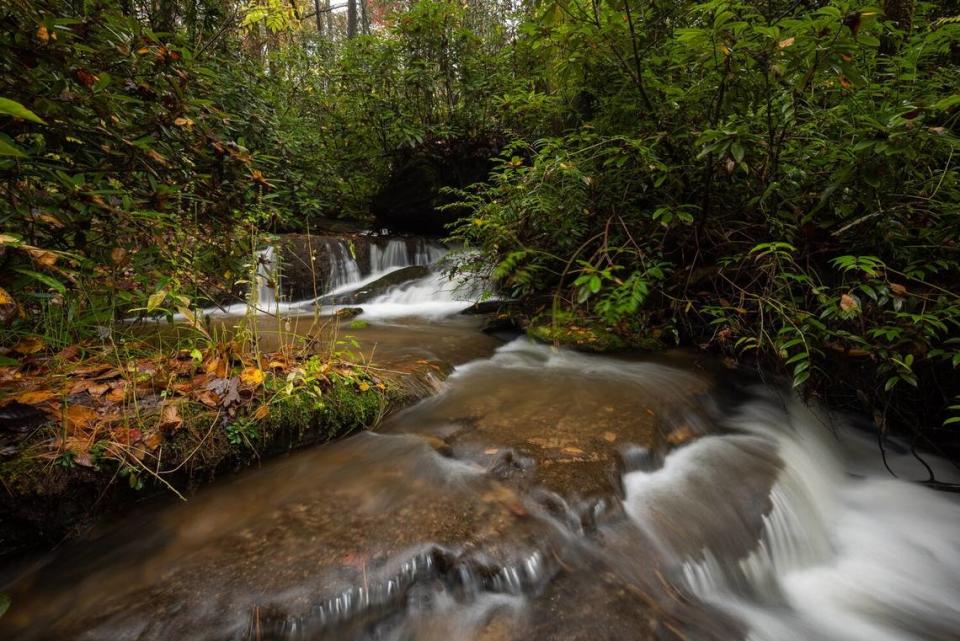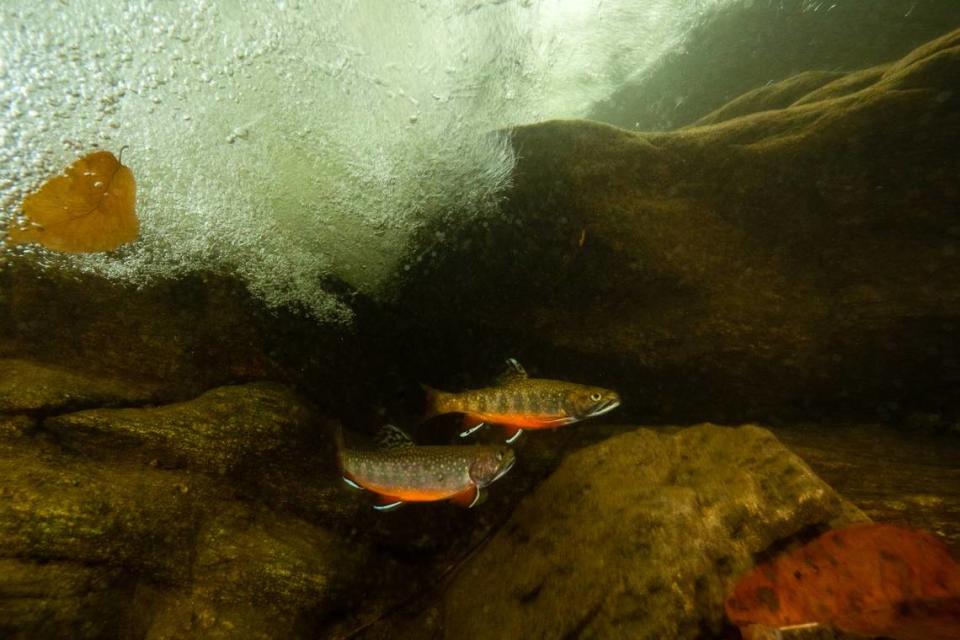SC hillbilly bar featured beer, music and fights. The site is now a preserve for rare fish
If you ever traveled up Highway107 in South Carolina’s mountains, you may have seen Burrell’s Place, a ramshackle building where cheap beer, bluegrass music and Appalachian people came together.
It wasn’t much to look at from the highway, but it stood as a kind of landmark for those headed to Cashiers and Highlands, just across the state line in North Carolina. A hand-painted sign adorned the wooden building, a structure so creaky it looked as if it was about to fall down.
Inside, the alcohol flowed, and on certain weeknights, local musicians stopped by to pick and talk. Sometimes fights broke out, leaving the bar with an unsavory reputation.
Now, years after Burrell’s Place closed, the property surrounding the old bar has a new purpose. An Upstate conservation group acquired the land to restore a trout stream that had been dammed up long ago.
It’s a story that has environmentalists excited and old-time customers of Burrell’s Place shaking their heads. The last thing folks would have thought is for pub owner Morgan Burrell’s land to become a trout sanctuary, one former patron said.
“I would never have expected anything like that; he wasn’t no environmentalist,’’ said Ken Cash, who visited Burrell’s Place on more than one occasion in the 1980s.
What led to the trout restoration effort was a dam that the Burrell family maintained for years.
Sometime before the Burrells acquired the property in the 1930s, a dam was built on a four-mile long creek to make a fishing pond near where the bar later stood, said Morgan Burrell’s grandson, Jason. The family then made repairs to the dam to maintain the small lake, he said.
That made for a good fishing hole, but biologists say the dam hurt the native brook trout population in the creek below. Predator fish that had been stocked in the pond escaped into the stream — and they began gobbling up the brook trout, according to the U.S. Forest Service.
After the Naturaland Trust bought the more than six-acre tract around the site of the old beer joint three years ago, the group began working with state and federal agencies to bolster the once thriving brook trout population to the stream.
To do that, government agencies tore down the dam near Burrell’s Place. Clearer, cooler water that brook trout need to survive returned to the creek below the old dam, improving conditions for the native fish.
Natural resource agencies also removed any remaining trout from the creek and shipped them to the Walhalla state fish hatchery nearby for keeping. Then, the S.C. Department of Natural Resources used a targeted type of pesticide to eliminate predator fish, a move officials say will give the trout a better chance of survival when they are returned.
Today, the U.S. Forest Service and the DNR are getting ready for the final phase of the project: actually putting the native South Carolina trout back in the stream. The DNR plans to restock the creek with the brook trout this winter.
“It is anticipated that the native brook trout will flourish in the four miles of mountain stream,’’ the Naturaland Trust said in a news release.
Restoring the stream, a tributary of the federally designated Wild and Scenic Chattooga River, is ecologically important because the state has relatively few brook trout streams left, said Keith Whalen, a Forest Service official who worked on the project.
At 4 to 7 inches long, brook trout are small compared to rainbow and brown trout, and they often prefer colder water than the bigger fish. “Brookies’’, as they are called informally, are the only trout native to South Carolina. Land-use practices in the 1800s and 1900s are believed to have contributed to diminished populations of brook trout.

The Naturaland Trust bought the 6.25-acre tract from a Burrell family member in 2020 for $130,000, then resold it to the federal government late last year as an addition to the Sumter National Forest in northern Oconee County, property records show.
Jason Burrell, whose grandfather died in 2003, said he was sad to sell the property adjacent to the site of the old bar. But he said he was having trouble keeping up with the land, which contained multiple buildings and the small lake.
(The actual site of the bar is still owned by a cousin who wanted to keep the sliver of land. The bar was torn down in the past decade.)
“It was bittersweet whenever I agreed on a price from the Naturaland Trust,’’ Jason Burrell, 45, said. “I played one of my grandfather’s favorite songs. I had a little tear in my eye.’’
The song, “Will You Miss Me,’’ is a classic bluegrass piece by Ralph Stanley.
“I’m glad they got it, rather than somebody that was going to develop it,’’’ Jason Burrell said. “They assured me it would return to its natural state. That made me feel a whole lot better about letting it go.’’
Burrell’s Place, which opened sometime around 1970 as a small grocery store, closed in 1997 after converting to a bar. Morgan Burrell “got religion’’ following years of selling beer and didn’t want to run the place anymore, his grandson said. For a while, other family members operated the bar until they shut it down, Jason Burrell said.
Those who frequented the bar were a mixture of hard-bitten Oconee County locals, travelers to Cashiers, and residents and college students from western North Carolina counties that did not sell alcohol. Some came just for the canned beer, but others liked the bluegrass played on Tuesday nights, locals said.
“There was no craft beer,’’ said Buzz Williams, an environmentalist in Oconee County who visited Burrell’s Place on occasion. “But they had everything a country boy would need: pickled eggs and regular beer.’’
Burrell’s Place wasn’t for everyone. A Confederate flag waved outside, its clientele was mostly white, and the bar wasn’t always peaceful.
Cash, a former resident of Cashiers, said fights would break out, making for a harrowing experience — until its owner took action.
Morgan Burrell, a heavy set man who sometimes sang with bluegrass bands, kept order with a baseball bat nestled behind the bar.
“He was kind of laid back until you got him mad,’’ Cash, 59, said.

In addition to Burrell’s Place, the property has a rich history, said Williams, who founded the Chattooga Conservancy, an environmental group in the mountains.
An owner before the Burrell family acquired the land in the 1930s, William Roland, once ran a toll gate on a road that would later become S.C. 107. As the story goes, everyone who wanted to get from Walhalla to Cashiers had to pay up. Rowland also had a small inn on the property.
Frank Holleman, president of the Naturaland Trust, said the once jumping nightspot just happened to have a trout stream that needed some love.
And his group was glad to help save the fish.
“It’s one of the best things we’ve ever done and one of the smallest properties we’ve ever acquired,’’ Holleman said. “The acreage isn’t big, but the importance in terms of the natural resources, natural history and ecology of the region, is huge.’’
Jason Burrell said it’s hard to believe the land around Burrell’s Place will become a haven for brook trout. He’s comfortable with it, but it’s a bit out of character for the property, given its history, he said.
If someone had told his grandfather years ago “we want to buy the property and turn it into a brook trout sanctuary, he’d probably have had some choice words for them to get in their vehicle and leave,’’ Jason Burrell said.


